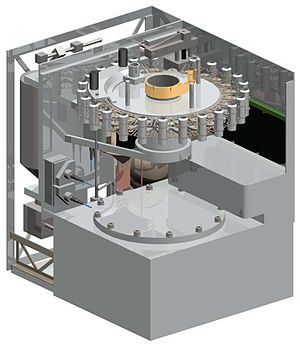Urey instrument
0% vetted

The Urey instrument, or Urey: Mars Organic and Oxidant Detector was a developmental spacecraft instrument for detecting organic compounds including amino acids.[1][2]
Overview[edit | hide all | hide | edit source]
It was funded by NASA and tested in the Atacama Desert in the early 2000s.[3] Urey was selected by NASA for further development in support ExoMars or any future Mars mission that could use Urey along with Mars Organic Molecule Analyzer, or Moma in 2007, funded with 1.5 million USD total (750k each)[4].[5] Urey was a suite of instruments that built on 15 years of research into detecting organic molecules.[6] Urey is a design for in situ biomarker detection, and it was tested in the early 2000s.[7] The device would also study the mysterious oxidants in Mars regolith.[8]
Urey was previously included on ExoMars rover in one of its iterations, and would have searched for organic compounds in Martian rocks and soils as evidence for past life and/or prebiotic chemistry. Starting with a hot water extraction, only soluble compounds are left for further analysis. Sublimation, and capillary electrophoresis makes it possible to identify amino acids. The detection would be by laser-induced fluorescence, a highly sensitive technique, capable of parts-per-trillion sensitivity. These measurements would be made at a thousand times greater sensitivity than the Viking GCMS experiment, and would significantly advance our understanding of the organic chemistry of Martian soils.[9][10][11] Urey would follow up on the Viking results which were inclusive and only sampled the very near surface.[12]
Urey had been selected for a time to a be on the Pasteur payload of the ExoMars rover,[13] however, it was developed for any Mars mission not necessarily ExoMars and was funded independently by NASA.[14]
One of components of Urey was the Mars Oxidant Instrument (MOI) and it was developed NASA Ames Research Center.[15]
Urey Suite:[16]
- Subcritical Water Extractor
- Mars Organic Detector
- Micro-Capillary Electrophoresis Instrument
- Mars Oxidant Instrument
Name[edit | hide | edit source]
Urey is named after Harold Clayton Urey (1893 – 1981) for his contributions to chemistry and other studies including winning the Nobel Prize in Chemistry in 1934.[17][18]
See also[edit | hide | edit source]
References[edit | hide | edit source]
- ↑ "UC device will seek life signs on Mars / Sensitive hand-sized instrument will try to detect amino acids". SFGate. Retrieved 2018-02-02.
- ↑ "NASA - Sensor Being Developed to Check for Life on Mars". www.nasa.gov. Retrieved 2018-02-02.
- ↑ "NASA - Sensor Being Developed to Check for Life on Mars". www.nasa.gov. Retrieved 2018-02-02.
- ↑ [1]
- ↑ "Spaceflight Now | Breaking News | NASA selects proposals for future Mars missions". spaceflightnow.com. Retrieved 2018-02-03.
- ↑ Aubrey, et al - The Urey Instrument: An Advanced In Situ Organic and Oxidant Detector for Mars Exploration - ASTROBIOLOGY Volume 8, Number 3 (2008
- ↑ [2]
- ↑ "NASA - ExoMars Urey Instrument (Includes NASA Ames Partnership)". www.nasa.gov. Retrieved 2018-02-03.
- ↑ "Inside ExoMars". European Space Agency. August 2012. Retrieved 4 August 2012.
- ↑ Skelley, Alison M.; Scherer, James R.; Aubrey, Andrew D.; Grover, William H.; Ivester, Robin H. C.; et al. (January 2005). "Development and evaluation of a microdevice for amino acid biomarker detection and analysis on Mars". Proceedings of the National Academy of Sciences. 102 (4): 1041–1046. Bibcode:2005PNAS..102.1041S. doi:10.1073/pnas.0406798102. PMC 545824
. PMID 15657130.
- ↑ Aubrey, Andrew D.; Chalmers, John H.; Bada, Jeffrey L.; Grunthaner, Frank J.; Amashukeli, Xenia; et al. (June 2008). "The Urey Instrument: An Advanced In Situ Organic and Oxidant Detector for Mars Exploration". Astrobiology. 8 (3): 583–595. Bibcode:2008AsBio...8..583K. doi:10.1089/ast.2007.0169. PMID 18680409.
- ↑ [3]
- ↑ [4]
- ↑ "Spaceflight Now | Breaking News | NASA selects proposals for future Mars missions". spaceflightnow.com. Retrieved 2018-02-03.
- ↑ "NASA - Mars Oxidant Instrument (MOI)". www.nasa.gov. Retrieved 2018-02-02.
- ↑ Aubrey, et al - The Urey Instrument: An Advanced In Situ Organic and Oxidant Detector for Mars Exploration - ASTROBIOLOGY Volume 8, Number 3 (2008)
- ↑ [5]
- ↑ Piquepaille, Roland. "NASA's Mars life-detector | ZDNet". ZDNet. Retrieved 2018-02-02.
External links[edit | hide | edit source]
| This article uses material from Urey instrument on Wikipedia (view authors). License under CC BY-SA 3.0. |
